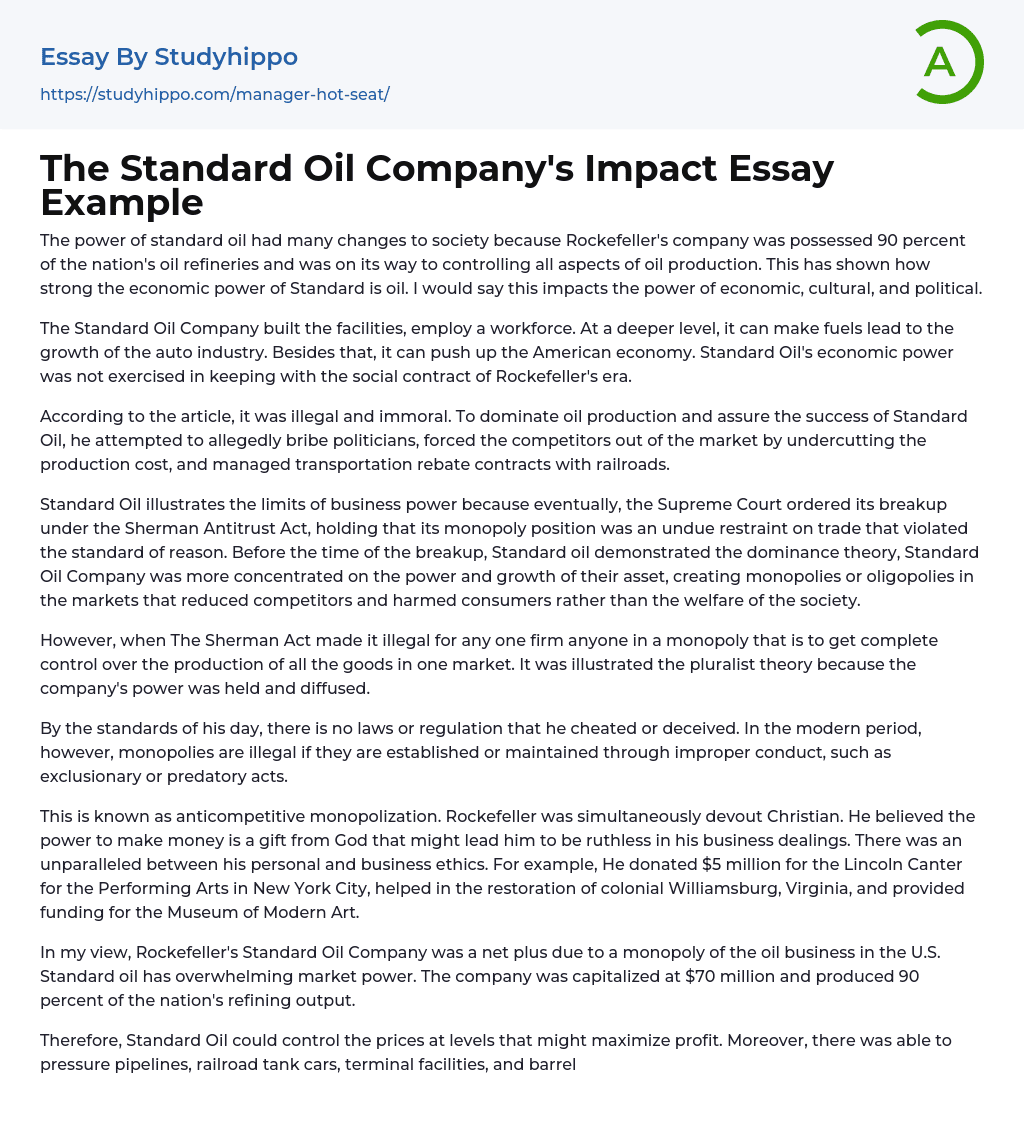The influence of Standard Oil on society was extensive, as Rockefeller's company owned 90 percent of the nation's oil refineries and sought to dominate all aspects of oil production. This demonstrates the significant economic power of Standard Oil, which also impacts cultural and political spheres. Moreover, the company constructed facilities and employed a dedicated workforce.
At a deeper level, the ability to make fuels contributes to the growth of the auto industry and boosts the American economy. However, Standard Oil's economic power during Rockefeller's era did not adhere to the social contract and was deemed illegal and immoral, as stated in the article.
Standard Oil's founder took various actions to ensure the company's success and dominate oil production, including engaging in political bribery, undercutting competitors' production costs, and securing advantageous transportation rebate contracts with railroad
...s. However, the Supreme Court eventually broke up Standard Oil under the Sherman Antitrust Act, acknowledging that corporate power has its limitations. The court found that the company's monopoly position was an unfair restraint on trade and violated reasonable standards. Prior to its breakup, Standard Oil exemplified the dominance theory by prioritizing its power and asset growth, which led to the creation of monopolies or oligopolies that harmed competition and consumers rather than benefiting society. Nevertheless, the implementation of the Sherman Act made it illegal for any one firm to have complete control over goods production in a single market.
Pluralist theory was exemplified as the power of the company was both held and diffused. According to the standards of its time, there were no laws or regulations violated, ensuring the absence of cheating or deception. In the contemporary era, though, monopolies are prohibited
if they are created or sustained through improper behavior, such as exclusionary or predatory actions. This is commonly referred to as anticompetitive monopolization.
Rockefeller's profound religious beliefs resulted in him regarding the accumulation of wealth as a divine favor, causing him to become merciless in his business dealings. This led to a discrepancy between his personal principles and ethical conduct in business. However, he also demonstrated generosity by making substantial contributions such as $5 million for the Lincoln Center in New York City, assisting with the restoration of colonial Williamsburg, and providing financial support for the Museum of Modern Art. Despite Standard Oil Company having a monopoly on the American oil industry, I believe its overall influence was advantageous.
Standard oil, with a capital of $70 million and a 90% share in the nation's refining output, had substantial market control. This enabled them to establish prices for optimal profit and exert influence on pipelines, railroad tank cars, terminal facilities, and barrel manufacturing factories in order to secure favorable rates.
The Standard Oil Company contended that their consolidation led to cost reduction by eliminating redundant and inefficient facilities, while also benefiting from economies of scale resulting from increased output. They also asserted that the increased production enabled them to invest more in efficient production facilities and allocate funds for research and development. Although Rockefeller may have exhibited a ruthless demeanor driven by greed and a desire for wealth, he ultimately achieved success by utilizing his wealth to support philanthropic initiatives. Religion played an integral role in shaping Rockefeller's beliefs throughout his life, with acts of charity forming the basis of his achievements.
He established several notable charitable organizations, including the
Rockefeller Institute for Medical Research, the General Education Board, the Rockefeller Sanitary Commission, and The Rockefeller Foundation. Additionally, he was known as a supporter of capitalism from the perspective of social Darwinism and is often quoted as saying "The growth of a large business is simply a survival of the fittest".
References
https://www.scribd.com/doc/51690349/case-studies-1, https://www.girardgibbs.com/antitrust-monopoly/, https://www.huduser.org/Datasets/IL/IL08/in_fy2008.pdf
- Board Of Directors essays
- Brand Management essays
- Business Ethics essays
- Business Management essays
- Change Management essays
- Comparative Analysis essays
- Decision Making essays
- Dispute Resolution essays
- Knowledge Management essays
- Leadership essays
- Leadership and Management essays
- Manager essays
- Operations Management essays
- Performance Management essays
- Product Management essays
- Project Management essays
- Quality Management essays
- Risk essays
- Risk Management essays
- Scientific Management essays
- Stress Management essays
- supply chain management essays
- Time Management essays
- Total Quality Management essays
- American Dream essays
- Barriers To Entry essays
- Capitalism essays
- Central Bank essays
- Compensation essays
- Consumerism essays
- Economic Development essays
- Economic Growth essays
- Economic Inequality essays
- Economic System essays
- Economy essays
- Employment essays
- Export essays
- Finance essays
- Free Trade essays
- Gross Domestic Product essays
- Human Development essays
- Income Inequality essays
- Industry essays
- Inflation essays
- International Business essays
- International Trade essays
- Macroeconomics essays
- Materialism essays
- Max Weber essays
- Microeconomics essays




